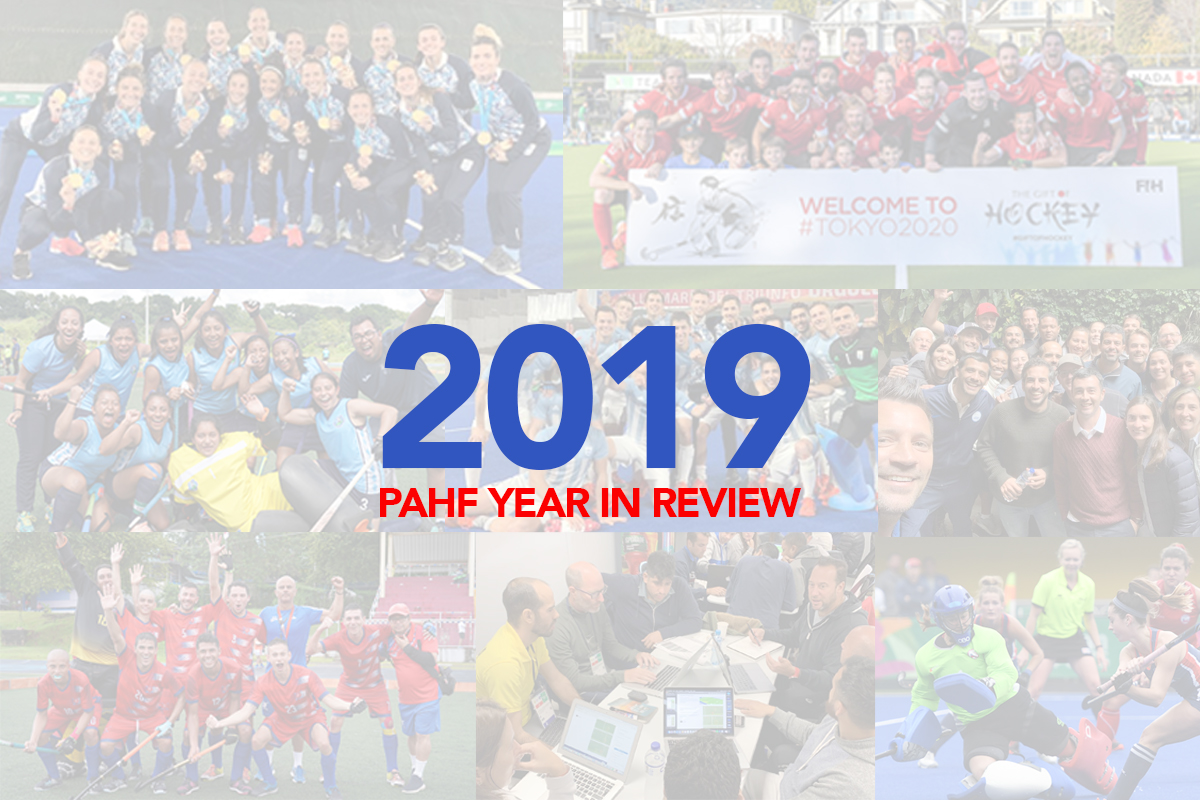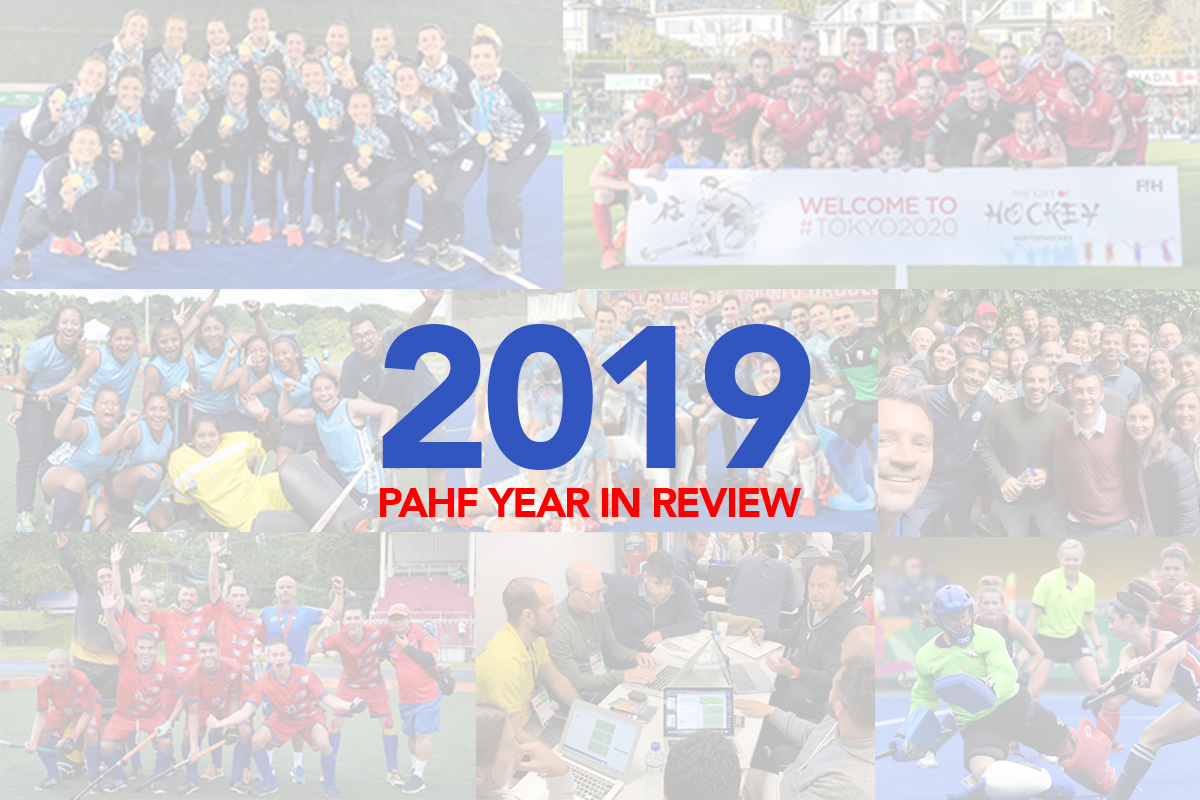
The year started with the Pro League – the International Hockey Federation’s (FIH) showpiece global home and away league that pits the best of the best against each other – and ended with an announcement that there will be a Hockey5s World Cup in 2023.
While the big guns of Argentina men and women and USA women are involved and centre stage in the FIH Pro League, and Argentina and Canada men have their sights on Tokyo 2020, for most nations within PAHF, it is the news of the Hocky5s World Cup that should be the most exciting. Here is an opportunity for nations who cannot afford multiple astroturf facilities and a state funded national team to really get a foothold on the international stage.
Many PAHF regions have a head start when it comes to Hockey5s. Costa Rica held an international clubs competition in October, with teams from Honduras and Guatemala taking part. Just a month later and the Central American Hockey 5s Championships took place in Panama, with four men’s and three women’s team competing. Guatemala were successful in the women’s event, beating Costa Rica on shoot-out after a tense final ended 1-1. Puerto Rico were crowned men’s champions after they beat Costa Rica, again on shoot-out.
And PAHF has form when it comes to showcasing Hockey5s after the Youth Olympic Games in Buenos Aires in 2018 saw people flocking to watch the exhilarating matches. By 2023, the PAHF teams currently developing their Hockey5s national squads should be in a great place to contest the medals.
The FIH Pro League brought mixed results for our teams. Argentina women enjoyed a good campaign and finished second overall in the league standings. Their participation in the Grand Final weekend in Amsterdam was less successful as they finished fourth after losing to Germany in the shoot-out for the bronze medal. Despite this, Micaela Retegui was awarded best Goal of the Grand Final after she scored a beautifully improvised goal in the match against Germany and Carla Rebecchi enjoyed a triumphant return to the national squad with a number of Player of the Match awards.
For the men, it was a less rewarding experience. Los Leones finished just outside the top four, beaten to a place in the Grand Final by Great Britain. The Argentina campaign had been soured earlier in the competition when their home match against Germany was cancelled due to highly volatile weather conditions. Under the FIH regulations the match was not rescheduled and the teams were awarded just a point apiece. Had Argentina won that match, they would have finished higher in the league than Great Britain and appeared in the Grand Final.
FIH has since changed both the format of the Pro League and the cancellation policy. For the 2020 season, teams will not play home and away fixtures against every other team. They will play half their fixtures at home and half away but each fixture will comprise two matches. For example, if USA travel to play Argentina, they will play two matches in Argentina on consecutive days. For this season, Argentina will not travel for a return fixture against USA. The revised schedule cuts the travel for teams in half.
In the event of a cancelled match, the winner of the other match will receive double points. If the second match is drawn then the winner of the shoot-out will receive four points and the loser two points. If both matches are cancelled, the teams each receive three points.
For USA women, 2019 was a year probably best forgotten. The team finished at the bottom of the Pro League, with only one win to their name. They finished in bronze medal position at the Pan American Games in Lima – their lowest finish at the event since 1991, and they failed to qualify for Tokyo 2020 Olympic Games after losing to India in the Olympic Qualifier in October. Head coach Janneke Schopman stepped away from the role in November and the search is now on to find a replacement head coach who can reverse this slide in form.
It wasn’t all bad news for USA hockey. The men’s team performed well at the FIH Series Finals, winning their way through to the semi-finals. Here they met a tough South African side and so the USA team’s dream of an Olympic place ended. However, the team rose up the world rankings to 24th and won admirers for their attacking style of hockey.
2019 was also the year of the Pan American Games. The spotlight was on Lima in Peru as the Central American nation hosted its first multi-sporting international event. Two brand new water-based pitches were laid to host the hockey events and these facilities will now provide a home for Peru’s hockey teams as they seek to increase participation and raise their international hockey profile.
The event itself was a triumph, with Argentina men and women claiming gold at the expense of Canada men and women, but the bigger picture is about what the new facilities will mean for hockey in Peru. Gianni Delucchi, President of the Peru Hockey Federation is is no doubt as to the importance: “We are looking forward to making much more progress. We are going to rekindle and develop the passion for hockey that we have always had in South America and look to shorten the gaps between us [Peru] and the other, higher-ranked countries in the Pan American zone.”
Much of 2019 was focused on qualifying for the Olympic Games Tokyo 2020. As Pan Am Champions Argentina men and women booked their places automatically. For Chile men and women, the already mentioned USA men’s team, Canada men and women, Mexico men and women and Uruguay women, the FIH Series Finals represented a chance to take a step closer to joining Argentina at the blue riband event in Tokyo. In the event both Canadian teams and Chile women made it successfully through this stage. Canada men beat Malaysia to make it to the Olympic Qualifiers, while the women finished second to Spain but also qualified for the next stage. Chile women lost in the semi-finals to higher ranked India by a 4-2 scoreline but a third place finish meant they also earned a place in the Olympic Qualifiers.
The Olympic Qualifiers were a thrilling set of double-header matches. By a twist of fate both Canada men and women faced Ireland, while Chile found themselves up against the reigning Olympic champions, Great Britain.
Canada men had probably the most talked about match of all 28 Olympic Qualifier encounters. They lost the first match 5-3. They dragged the result back to 6-6 in the second game before then going on to win the shoot-out, despite going 3-1 down.
Canada women had a similarly close encounter with the Irish. Nothing could separate the teams and so they finished 120 minutes of hockey drawn at 0-0. The results of the men’s matches were reversed as Ireland overturned an early Canadian lead in the ensuing shoot-out to win and secure a place at Tokyo.
For Chile, the trip to London to play Great Britain was a step too far. The eventual 3-1 scoreline was no disgrace but the difference between the higher ranked Great Britain team and the up and coming Diablas was clear to see. Captain Camila Caram reflected on her team’s results and the harsh realities of a world where some teams are better resourced than others: “Many PAHF teams do not receive that much support. Canada, Chile and Mexico, for example, are all completely amateur teams that have to live a double life, combining work, study, playing and training. We live a completely different reality to the European countries so it is very hard to compete. When an amateur team plays a professional team and only loses by one or two goals, that is a great achievement.”p
For teams such as Chile, Uruguay, Mexico and Canada women, 2020 will be a quiet year in contrast to 2-019’s emotional roller-coaster. But for the players, coaches and officials who are Tokyo bound, it could be a defining year. We hear from some of those people here.
Scott Tupper, Canada’s inspirational captain says: “I am greatly looking forward to Tokyo, and the several months leading up to it. I always enjoy the build-up and anticipation as we lead in to a major event, so 2020 on the whole is going to be really special.
“What would I like for 2020? Aspiring to compete with the best teams in the world in 2020, to hopefully upset the rankings and wishing for our group to arrive healthy and compete in Tokyo to the best of our abilities.”
Delfina Merino spent a lot of 2019 suffering and then recovering from a knee injury. For her there is only one thing on her mind: “I want to enjoy every aspect of my hockey next year, both on and off the field. We will be training so hard for the Olympics but I will embrace and enjoy that whole process. And of course, it is time Las Leonas won Olympic gold.”
Reigning Olympic champions Argentina men will be looking to win back-to-back medals. Multi-capped Lucas Vila is hoping for a repeat performance: “My wishes for 2020 of course are focused on Tokyo 2020. I really would like to enjoy it in the same way we did in Rio. We still have to build the team and be strong in Tokyo. We have got to be a team that is hard to beat, that nobody wants to play against.
“Then, I hope to stay healthy to be able to play my best hockey.”
The last words for this year-end review go to one of the sport’s up and coming officials, Trinidad and Tobago’s Ayannah McClean: “For me 2019 has been an amazing, yet exhausting, hockey year. The announcement that I had been named to the Tokyo 2020 Summer Olympics Games team was, hands down, no doubt, the number one highlight.
“As we head into 2020, my main focus is on all the training and preparation needed for the Games and I plan to encompass all aspects to ensure success. I want to wish the entire Games team success in their training and prep. To my PAHF family, in 2020 I wish everyone all the best for themselves and their families, and success in the upcoming events. Remember to embrace change, improve on your strengths, work on your weaknesses and have fun doing it.”


